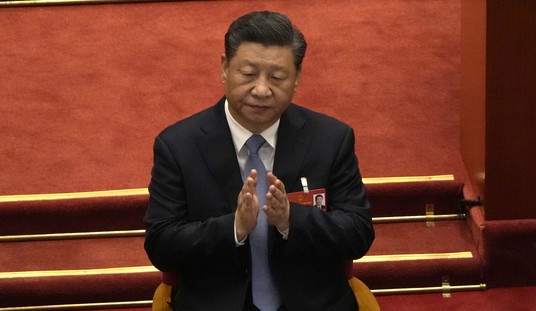I was the third generation in my family to serve in the Army. My paternal grandfather served during World War 1, although he didn't go Over There. My Dad was a World War 2 veteran. I served in Operation Desert Storm and was recalled for Operation Joint Endeavor, although in that last deployment, I went no farther than Heidelberg, where I was on the staff of the Command Surgeon, US Army, Europe; the greatest threat I faced in that last action was a hangover from all that great German beer.
Before he died, I remember my Dad telling me how proud he was of our three generations of service. He had a framed photo on the wall of Grandpa, himself, and me, all in uniform. He made a point of showing that to visitors.
He also told me how glad he was that I had been spared serving in a third world war. Truthfully I was (and am) pretty content with that as well. But now, today, the world is once more a tense place, perhaps more so than it has been since before the fall of the Soviet Union. I'm too old now - but I have grandsons, one of whom is approaching service age. They (and their sisters) are my hostages to fortune in an increasingly uncertain world. I don't want them to face fighting a third world war. But they may.
General Sir Roly Walker, the head of the British Army, has stated that Britain should prepare for a major war with the CRINKS nations (China, Russia, Iran, and North Korea) in three years - and let's be honest, we know they won't be. Britain is no longer great; they can neither project power nor maintain a full-scale war footing more than a few days before their capacity is exhausted. But the United States may not be in any better shape.
See Related: WATCH: Gen. Keane Weighs In on the Path to World War III, How US Adversaries Treat Trump Vs. Biden
In 2022, a group of non-government officials was tasked by Congress to conduct an independent assessment of the state of the United States armed forces, and our preparedness for a major war. What they found was, frankly, unsettling.
In late July, a body of non-governmental national security experts, first tasked by Congress in 2022 under the Commission on the National Defense Strategy, released an evaluation of the U.S.’ overall security strategy put forward by the Biden administration two years ago.
The commission found that after decades of post-Cold War policies that cut defense spending and reduced investments in the security sector, Washington, D.C., is "not prepared" to counter Beijing in open conflict, let alone a multi-front war against China, Iran, North Korea and Russia.
The commission, which included four Republicans and four Democrats who served under the Clinton, George W. Bush and Obama administrations, looked to make clear the lack of preparedness was not the fault of a single administration, but rather the failure of a generation of leaders to identify and counter the growing danger posed by authoritarian nations, as well as to adequately explain the threat to the American public.
That's what Bill Clinton called the "peace dividend." "The Cold War is over," the prevailing wisdom stated, "...so we can take all that money we were spending on tanks, ships and bombers and buy votes instead." That assessment may turn out to be catastrophically wrong. The world is increasingly uncertain, and we are increasingly unprepared.
See Related: Might China Launch a Surprise Attack - Against Japan?
One primary concern is munitions. Throughout history, every war has been won or lost by logistics. There is a saying among military folks, that when studying military history, "Amateurs study tactics. Professionals study logistics." The side wins that can keep pushing the most beans and bullets forward - and we don't have enough bullets:
After reviewing unclassified war games, the commission found that even with Washington’s efforts to ramp up weapons stockpiles following Russia’s invasion of Ukraine, the U.S. would likely still exhaust its munitions inventories within three to four weeks if it were to engage in open conflict with Beijing.
Russia, China, Iran, and North Korea - the CRINKS Axis - are all nations on the edge. They have several things in common that make them so:
- Autocratic leaders. In Russia, Tsar Vladimir I, despite being an old Soviet KGB apparatchik, has seemingly re-established the Russian Empire with himself as ruler for life. In China, Chairman Xi has amassed more personal power than anyone since Mao. Iran's mullahs retain their iron grip on power, and in North Korea, the stunted little gargoyle with bad hair from the long line of stunted little gargoyles with bad hair isn't going anywhere.
- Demographic crises. All four of the CRINKS nations have aging populations and are poised on the edge of a demographic cliff.
- Economics. China in particular is a house made of wet cardboard; most of their supposed economic might is smoke and mirrors. Russia is essentially a gas station with some nuclear weapons.
All of these things are recipes for trouble. These factors make for an unstable country - and unstable countries, ruled by unstable people, are the ones that all too often start wars. Maybe to distract from other problems; maybe to grab resources - war is all too often armed robbery writ large.
That's the threat we face. That's the threat we aren't ready for. Perhaps none of them will try anything - but if they do, and we aren't ready, well, I'm sure you can work out how that will end.
Raising our readiness will take more than just a budget. It will take a major cultural shift, in the halls of Washington, in the puzzle-palace of the Pentagon, and across the fruited plain. In my father's time, when the Empire of Japan attacked Pearl Harbor, we had some luxury of time and two huge oceans insulating us from most of the war; aside from some brief scrapping in the Aleutians, and a very few rumored infiltrators elsewhere, no enemy soldiers ever set foot on American soil except for prisoners of war. But we no longer have that luxury. The globe is much smaller than it was in 1941. Even the Hermit Kingdom of North Korea has weapons that can strike the continental United States. Russia and China can do so with ease. We can reach them, too, but weapons storage is not a cornucopia. We cannot, at present, sustain a major war effort against either Russia or China; we are in the position Japan was in early 1942 when Admiral Yamamoto warned the Emperor that Japan had six months, at most, to win. Except, in a modern war, that time frame may well be six days.
If there is a third world war or even a major regional war, say in the west Pacific, it will take America rediscovering a World War 2 level of martial commitment to survive, much less to win - and it's not at all clear that we have that capacity.















